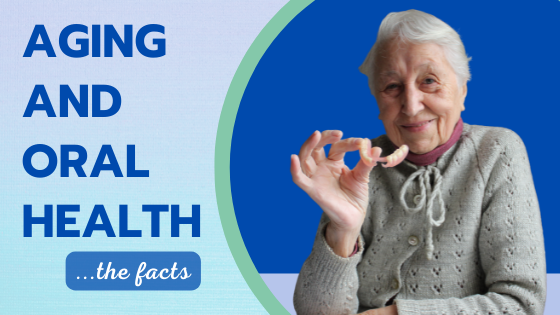It’s a fact that getting older results in changes to our dental health, so have you ever wondered what you can do to make sure that your teeth withstand the test of time? Is it inevitable that as we age, we will lose teeth and require dentures? Let’s talk about aging and the realities behind senior dental hygiene!
A leading reason for tooth loss amongst seniors is gum disease. What starts as mild gingivitis can advance to a severe gum disease called periodontitis, which can lead to the loss of teeth and irreversible gum damage if left untreated. According to the CDC, “70.1% of adults 65 years and older have periodontal disease,” which is not a comforting statistic! However, it is a myth that senior adults need to lose their teeth, and with preventative care, there is no reason that gum disease leading to tooth loss cannot be kept in check.
Another age-related oral health occurrence is stained and weakened enamel. Our teeth aren’t immune to showing the signs of aging, and years of eating and drinking will eventually make themselves known on the surface of your teeth. Acids and sugars wear away enamel over time. This, too, can be slowed down significantly through measures such as a balanced diet with less acidic foods and standard oral hygiene.
A few more things to watch out for are decreased nerve sensitivity, dry mouth caused by medications, and gum recession. Decreased nerve sensitivity can lead to an absence of pain, but that does NOT mean that no problem exists–this can mask issues and lead to delays in treatment. Dry mouth can cause gum infections and increase the chances of tooth decay. Gum recession can expose the sensitive root of a tooth and provide a haven for bacteria to accumulate.
Unfortunately, in addition to all of the above, aging and its associated health problems can create physical limitations that make it more difficult to properly maintain oral health. Chronic health conditions can lower morale and lead to mental health issues like depression, which can make daily tasks more likely to fall by the wayside. Lower energy levels can mean prioritizing other health needs instead of oral care. In order to combat these factors, consider ideas like using a water flosser, setting tooth-brushing alarms on a phone or an alarm clock, and using a toothbrush with an extra-large handle.
This may all sound grim, but the good news is that an ounce of prevention is worth a pound of cure. Knowing how to find and treat problems is most of the battle when it comes to dental health. Plus, technology is always advancing, and new treatments will only get better with time. Following the below tips can help make sure your natural teeth will last for a lifetime!

- Make sure you have adequate calcium intake to support your teeth.
- To treat dry mouth and prevent enamel loss, stay hydrated and moderate your intake of beverages with alcohol or caffeine.
- To minimize gum recession, gently brush with a soft-bristled toothbrush and fluoride toothpaste and speak with your dentist to see what mouthwash may be right for you.
- Consider an electric toothbrush to be sure you are brushing more thoroughly and for a long enough time.
And, of course, two of the most crucial ways to maintain your overall dental health as you age are also the most obvious:
- Visit your dentist on schedule, ideally every six months, for routine cleanings
- Brush twice a day and floss daily
With care, knowledge, and a bit of luck, you can keep your entire mouth feeling healthy and looking fantastic no matter your age!
